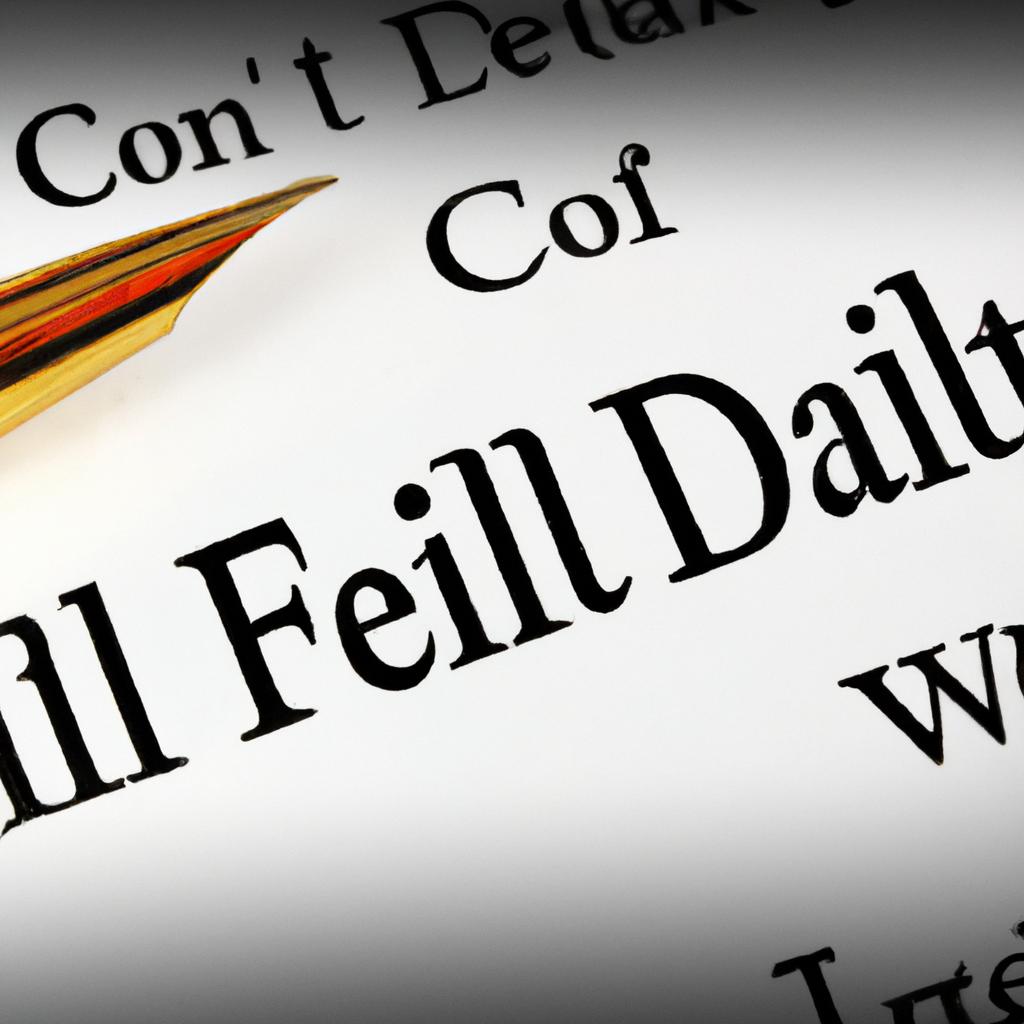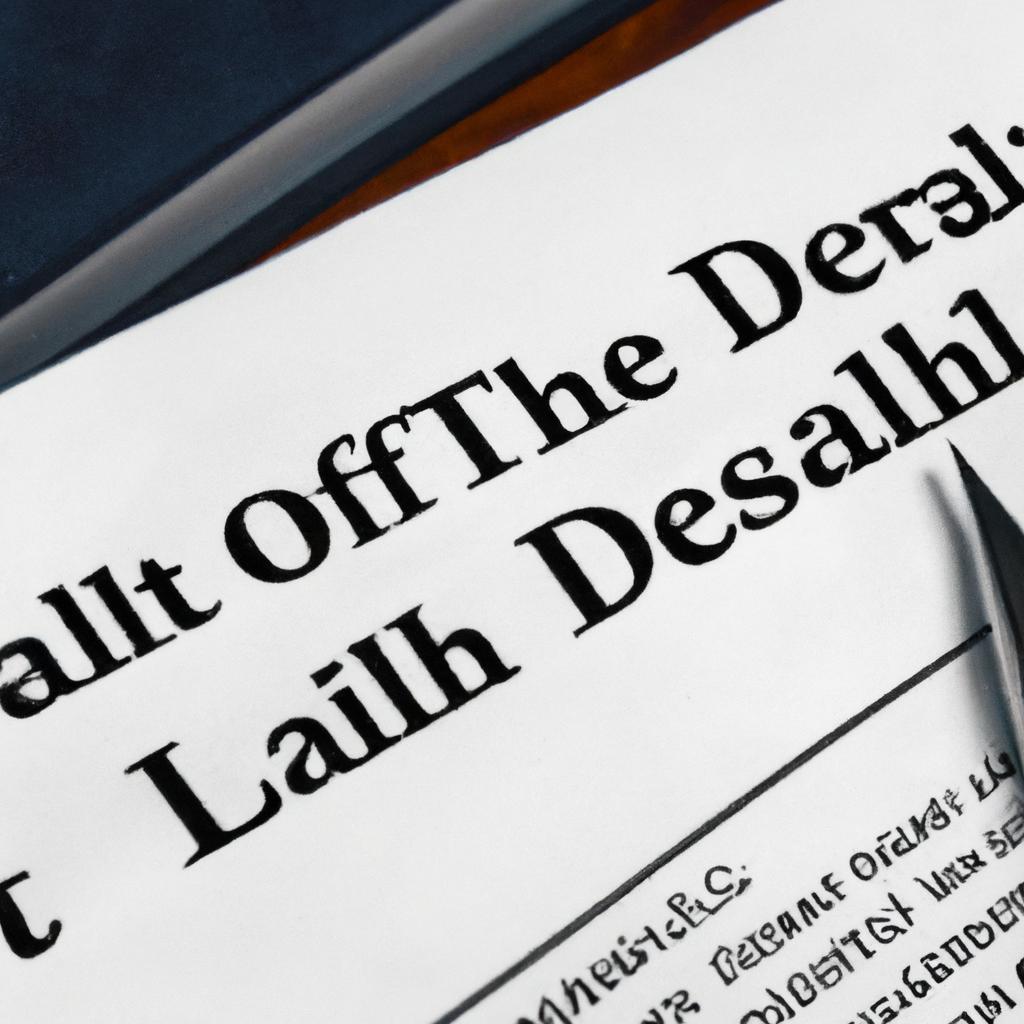In the intricate realm of estate law, the concept of the “will of death” looms ominously, casting a shadow of uncertainty over the handling of one’s final wishes. As experienced practitioners in the field of estate planning, probate, and elder law, the Morgan Legal Group of New York City navigates the complexities of Wills and trusts with precision and expertise. Join us as we delve into the enigmatic world of the “will of death”, examining its implications and consequences for those seeking to secure their legacies.
<img class=”kimage_class” src=”https://estatelawnewyork.com/wp-content/uploads/2024/08/QGNMqux9duvMApMocXYxphb0Qhw-253D.jpg” alt=”Understanding the Concept of the “Will of Death” in Estate Planning”>
Understanding the Concept of the “Will of Death” in Estate Planning
When it comes to estate planning, one important concept that individuals should be familiar with is the “will of death.” This term refers to the legal document that outlines a person’s wishes regarding the distribution of their assets upon their passing. The will of death is a critical component of estate planning, as it ensures that an individual’s final wishes are carried out and that their loved ones are provided for.
Creating a will of death involves a thoughtful and careful consideration of various factors, including the individual’s assets, liabilities, and beneficiaries. It is essential to work with an experienced estate planning attorney to draft a will that accurately reflects the individual’s intentions and complies with state laws. By creating a will of death, individuals can have peace of mind knowing that their estate will be distributed according to their wishes, providing clarity and security for their loved ones.

Key Considerations When Dealing with the Implications of the “Will of Death”
When facing the implications of the “Will of Death,” it is crucial to carefully consider several key factors to navigate this complex legal territory. One of the primary considerations is the validity of the will itself. Ensuring that the document meets all legal requirements and has not been subject to coercion or fraud is essential to upholding the testator’s true intentions.
Additionally, understanding the potential conflicts that may arise among beneficiaries is paramount. Anticipating and addressing any disputes that could arise from the will can help mitigate the risk of lengthy and costly legal battles. Communication and transparency with all parties involved in the estate planning process are key to avoiding misunderstandings and ensuring a smooth execution of the testator’s wishes.

Navigating Legal Challenges Associated with the “Will of Death” in New York
When it comes to the “Will of Death” in New York, there are a number of legal challenges that individuals may face. One of the main issues that can arise is the validity of the will itself. If there are suspicions of fraud, coercion, or lack of capacity at the time the will was created, it can lead to a lengthy and complicated legal battle.
Another challenge associated with the “Will of Death” in New York is the potential for family disputes and conflicts over the distribution of assets. Emotions can run high during this time, and having a skilled attorney to navigate these contentious situations can be invaluable. At Morgan Legal Group, our experienced lawyers are well-versed in handling all aspects of estate planning and probate, and we can provide the guidance and representation needed to protect your interests and ensure a smooth resolution to any legal challenges that may arise.

Recommended Strategies to Safeguard Against the Risks Posed by the “Will of Death
When facing the risks posed by the “Will of Death,” it is crucial to implement strategic measures to safeguard against potential legal complications and ensure the protection of your assets. One recommended strategy is to regularly review and update your estate plan to reflect any changes in your circumstances or wishes. This includes updating beneficiaries, executor appointments, and asset distributions to align with your current intentions.
Additionally, it is advisable to seek professional legal guidance from experienced estate planning attorneys, such as Morgan Legal Group in New York City. Our team can help you navigate complex legal issues, create a comprehensive estate plan, and provide valuable insights on how to protect your assets from the risks associated with the “Will of Death.” Trust in our expertise to safeguard your legacy and ensure a secure future for your loved ones.
Q&A
Q: What is the “will of death” and how does it differ from a regular will?
A: The “will of death” is a document created by an individual who intends to end their life in a peaceful manner. Unlike a regular will which dictates how a person’s assets and possessions are to be distributed after their death, the ”will of death” outlines the person’s wishes for how their final moments should be handled.
Q: Is creating a “will of death” legal and recognized by the law?
A: The legality of a “will of death” varies depending on the jurisdiction. In some areas, it may be considered a valid form of expressing one’s end-of-life wishes, while in others it may not hold up in court. It is important to consult with legal experts in your area to determine the legal implications of creating such a document.
Q: What are some common provisions that people include in their “will of death”?
A: Some common provisions that people may include in their “will of death” are instructions for medical treatment, requests for specific spiritual or religious rituals to be performed, and directives for how their remains should be handled.
Q: How should one go about creating a ”will of death”?
A: Creating a “will of death” should be approached with careful consideration and consultation with professionals such as lawyers, medical practitioners, and spiritual advisors. It is important to ensure that the document accurately reflects the individual’s wishes and is legally enforceable.
Q: What are the ethical considerations surrounding the creation and implementation of a “will of death”?
A: The ethical considerations surrounding the creation and implementation of a “will of death” are complex and personal. It is essential for individuals to consider the impact of their decisions on their loved ones, healthcare providers, and society as a whole. Seeking guidance from ethical experts and engaging in open and honest discussions with those affected by the document can help navigate these difficult questions.
Wrapping Up
As we reflect on the mysterious phenomenon of the “will of death,” one thing becomes clear - death is a force beyond our comprehension, operating in ways we cannot fully understand. Whether it is a mere coincidence or a sinister power at play, the stories of those who have succumbed to the will of death challenge our understanding of mortality and fate. As we continue to ponder the mysteries of life and death, may we approach each day with gratitude and humility, knowing that our time on this earth is fleeting, and that the will of death may one day come for us all.
 The Will of Death: What You Need to Know
The Will of Death: What You Need to Know
Death is an inevitable part of life that can leave a significant impact on our loved ones and their financial well-being. While we may not like to think about it, planning for our passing is essential to ensure that our loved ones are taken care of and our final wishes are carried out.
One crucial aspect of planning for death is creating a will. A will, also known as a testament, is a legal document that outlines how a person’s assets will be distributed after their death. It is a way to ensure that your possessions and assets are distributed according to your wishes and can help to avoid disputes among family members.
In this article, we will dive deeper into the concept of the “will of death,” discussing what it is, why it is essential, and how you can create one for yourself.
Understanding the Will of Death
The will of death is simply another term for a last will and testament. It is a legal instrument that outlines how a person’s assets and debts will be handled after they pass away. The purpose of a will is to let your loved ones know how you want your assets to be distributed, who will be in charge of administering your estate, and who will take care of minor children if applicable.
A will can also include other important instructions, such as funeral arrangements, the establishment of trusts, and the appointment of a guardian for dependent family members. It is up to you to decide what you want to include in your will, but it is recommended to consult with a lawyer to ensure that your will is legally binding and clear.
Why You Need a Will
If you do not have a will in place, your assets will be subject to the laws of your state, which may not align with your preferences. These laws, known as intestate succession laws, will determine who gets what and how much. This can lead to a lot of uncertainty and potential conflicts among family members, especially if you have blended families and children from different marriages.
On the other hand, having a will allows you to have control over your assets and belongings, ensuring that they are distributed according to your wishes. It also eliminates any confusion or disputes among family members, providing peace of mind for you and your loved ones.
Additionally, a will can also help to minimize estate taxes and other fees, which can save your loved ones from financial burden in the future. It can also expedite the probate process, making it easier for your assets to be distributed to your beneficiaries.
How to Create a Will
Creating a will may seem like a daunting task, but it is a relatively straightforward process. The first step is to determine what you want to include in your will. This can include your assets, such as property, bank accounts, investments, and personal possessions. You should also think about who you want to inherit these assets and how much you want them to receive.
Next, you will need to appoint an executor, who is responsible for carrying out the instructions outlined in your will. It is essential to choose someone you trust and who is capable of managing your estate. You can also name a backup executor in case the primary one is unable to fulfill their duties.
If you have children under the age of 18, you will also need to appoint a guardian for them in your will. A guardian is responsible for taking care of your children and managing their inheritance until they reach the age of majority.
Once you have determined all the necessary details, you can either write your will yourself or seek assistance from a lawyer. While it is possible to write your will yourself, it is recommended to have a lawyer review it to ensure that it is legally binding and clear. A lawyer can also provide valuable advice and help you avoid any potential mistakes.
Updating Your Will
It is essential to review and update your will periodically, especially if significant life events occur, such as marriage, divorce, or the birth of a child. Outdated wills can lead to disputes and complications, which can be avoided by keeping it up to date.
Benefits and Practical Tips for Creating a Will
– Creating a will allows you to have control over your assets and ensures that your final wishes are carried out.
– Having a will can help minimize family disputes and confusion among loved ones.
– It can save your beneficiaries from potential legal and financial issues.
– A will can also help to reduce estate taxes and other fees.
– When creating a will, be specific and clear about your intentions to avoid any misinterpretation.
– Make sure to appoint an executor and a backup executor who are capable and trustworthy.
– Keep your will up to date and review it periodically to make necessary changes.
First-Hand Experience
“I never thought I would need a will at a young age, but after seeing the complications and disputes that my friend’s family went through after her sudden death, I decided to create one for myself. It was a simple and straightforward process, and it gave me peace of mind knowing that my assets and my loved ones are taken care of in the event of my passing.” – Jennifer, 32.
In Conclusion
Planning for death can be a difficult and uncomfortable topic to broach, but it is a necessary one. The will of death, or your last will and testament, is a critical legal document that outlines how your assets and belongings will be distributed after your passing. It not only ensures that your final wishes are carried out but also brings peace of mind to you and your loved ones. So, don’t wait any longer and start planning for your will today.

